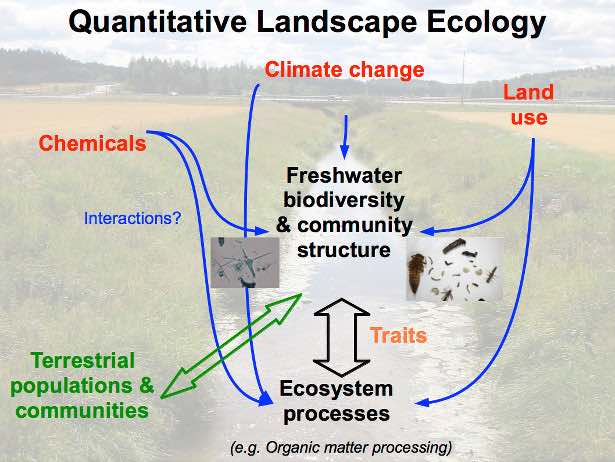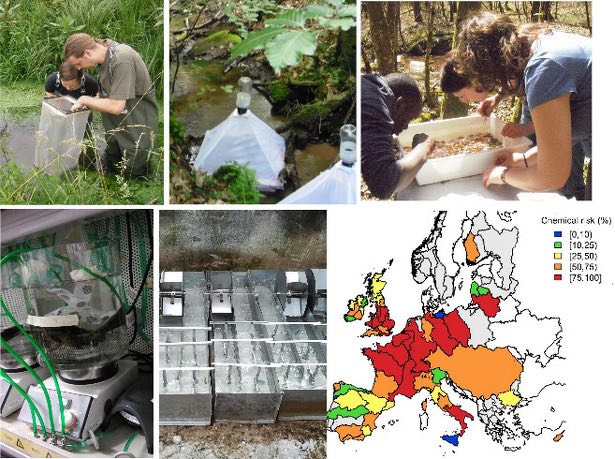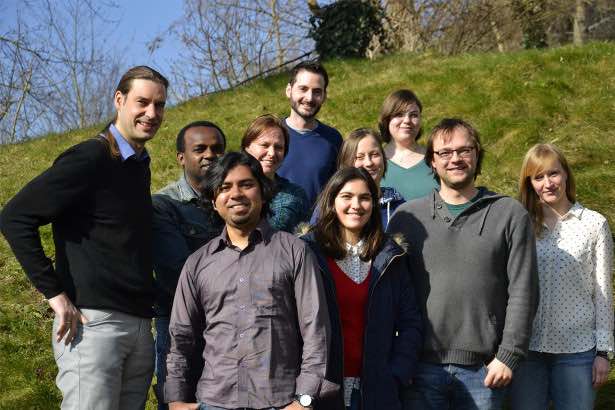In this new series of posts, research teams/groups of Landau’s Institute of Environmental Sciences introduce their Ecotoxicology-related research. This time: the group “Quantitative Landscape Ecology”
The working group “Quantitative Landscape Ecology”, headed by Jun.-Prof. Dr. Ralf B. Schäfer has its main focus on the effects of different anthropogenic stressors such as chemicals and climate change on freshwater ecosystems, especially on benthic invertebrates, microorganisms and ecosystem processes. They primarily conduct field studies or experiments, backed up by experiments in artificial systems, and data analyses to understand the relationships between stressors and ecological responses as well as interactions between stressors in a multiple stress context. Current topics in ecotoxicological research include:
- How important are pesticides under multiple stress conditions in agricultural streams?
- To which extent propagate neonicotinoid effects over trophic relationships and influence biodiversity-ecosystem functioning relationships?
- Are fungicides a relevant driver of microbial community composition and organic matter processing in agricultural regions?
- Do organic toxicants influence the biodiversity and distribution of benthic invertebrates? And if this is the case, can the effects be predicted with trait-based approaches?
- Large scale risk assessment of toxicants in freshwater ecosystems for Europe and the USA
- How do mixtures of common herbicide-fungicide-mixtures affect ecosystem processes and associated organisms? Can we predict the occurrence of mixtures from land use and pesticide application data?
Further details can be found under: https://www.uni-koblenz-landau.de/en/campus-landau/faculty7/environmental-sciences/landscape-ecology
The working group has a strong expertise and offers related theses to students on:
- field studies on the effects of toxicants in freshwater streams in different regions of the world
- conducting field-realistic experiments on the effects of pesticides on microbial and invertebrate communities and associated ecosystem processes
- sampling and analytics of organic toxicants including the development and application of novel sampling techniques
- development and application of trait-based approaches for the detection and prediction of effects of different stressors (e.g. toxicants, climate change, land use)
- development and application of novel techniques for ecological data analysis as well as spatial and statistical modelling
- aquatic-terrestrial biotic linkages and characterisation of trophic relationships using stable isotopes
- identification of benthic invertebrates and aquatic fungi
- determination of ecosystem processes such as organic matter decomposition, primary production and respiration
- applying landscape-ecological and macro-ecological approaches in the context of stress ecology
Overall, our aim is to quantify and predict the effects of different stressors on freshwater ecosystems and the related changes of ecosystem processes and their relevance for ecosystem services provided to human societies.
Check out individual pages of the team members here: https://www.uni-koblenz-landau.de/en/campus-landau/faculty7/environmental-sciences/landscape-ecology/Staff
You may also be interested in:
What are you working on? Part I: Team “Functional Aquatic Ecotoxicology”



